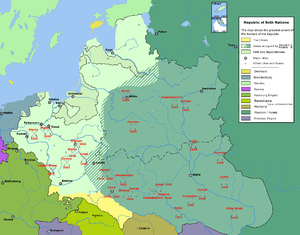Swedish Deluge
| The Deluge | |||||||
|---|---|---|---|---|---|---|---|
| Part of Northern Wars (Second Northern War) | |||||||
 The occupation of the Commonwealth by Sweden, Muscovy, Brandenburg and Khmelnytsky's Cossacks. |
|||||||
|
|||||||
| Belligerents | |||||||
|
|
||||||
| Commanders and leaders | |||||||
|
|||||||
| Strength | |||||||
|
Total: 69,000+ |
Total: 191,000+ |
||||||
| Casualties and losses | |||||||
| Estimated very high |
Estimated very high |
||||||
The term Deluge (Polish: pоtор szwedzki, Lithuanian: Tvanas) denotes a series of mid-17th-century campaigns in the Polish–Lithuanian Commonwealth. In a wider sense it applies to the period between the Khmelnytsky (Chmielnicki) Uprising of 1648 and the Truce of Andrusovo in 1667, thus comprising the Polish theatres of the Russo-Polish and Second Northern Wars. In a stricter sense, the term refers to the Swedish invasion and occupation of the Commonwealth as a theatre of the Second Northern War (1655–1660) only; In Poland and Lithuania this period is called the Swedish Deluge (Polish: potop szwedzki), and the term deluge (or potop in Polish) was popularized by Henryk Sienkiewicz in his novel The Deluge (1886).
During the wars the Commonwealth lost approximately one third of its population as well as its status as a great power. According to Professor Andrzej Rottermund, manager of the Royal Castle in Warsaw, the destruction of Poland in the deluge was more extensive than the destruction of the country in World War II. As Rottermund claims, Swedish invaders robbed the Commonwealth of its most important riches, and most of the stolen items never returned to Poland. Warsaw, the capital of the Polish–Lithuanian Commonwealth, was completely destroyed by the Swedes, and out of a pre-war population of 20,000, only 2,000 remained in the city after the war. According to the 2012 Polish estimates, financial losses of Poland are estimated at 4 billion zlotys. Swedish invaders completely destroyed 188 cities and towns, 81 castles, and 136 churches in Poland.
...
Wikipedia
